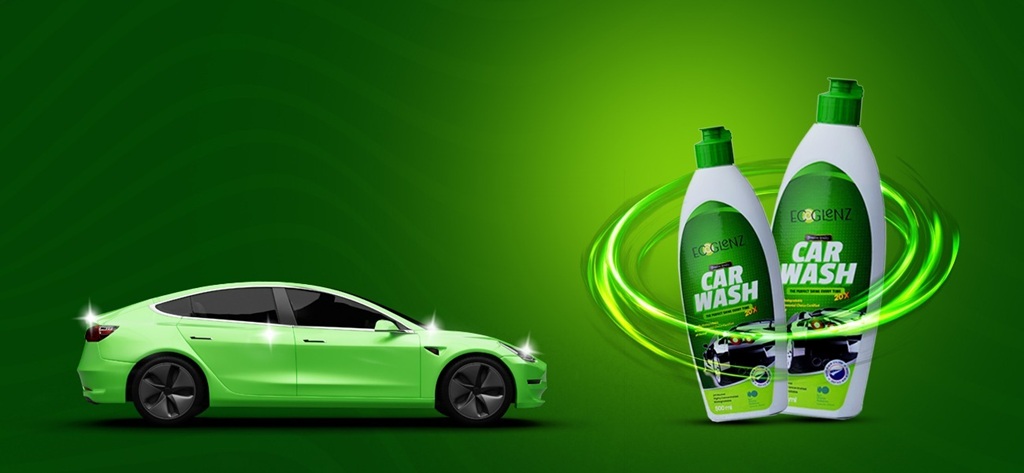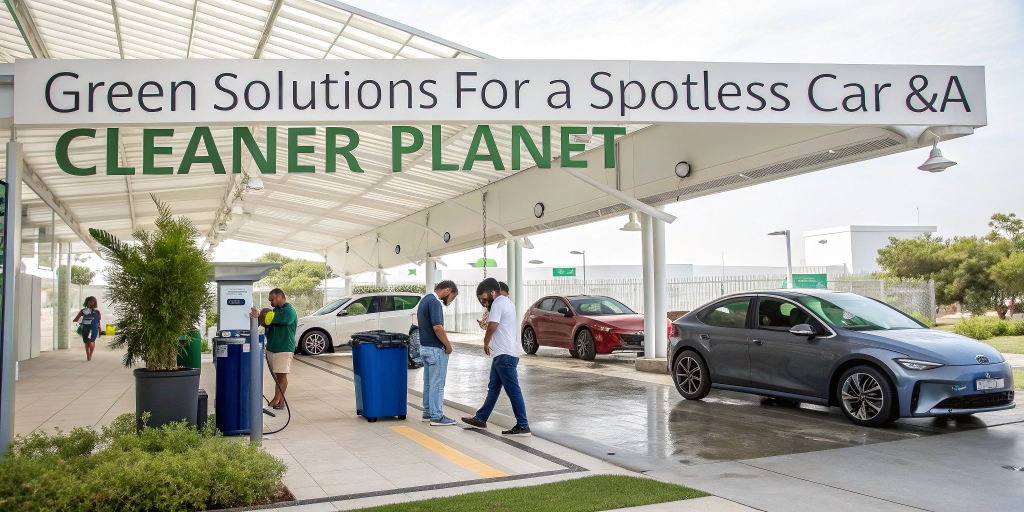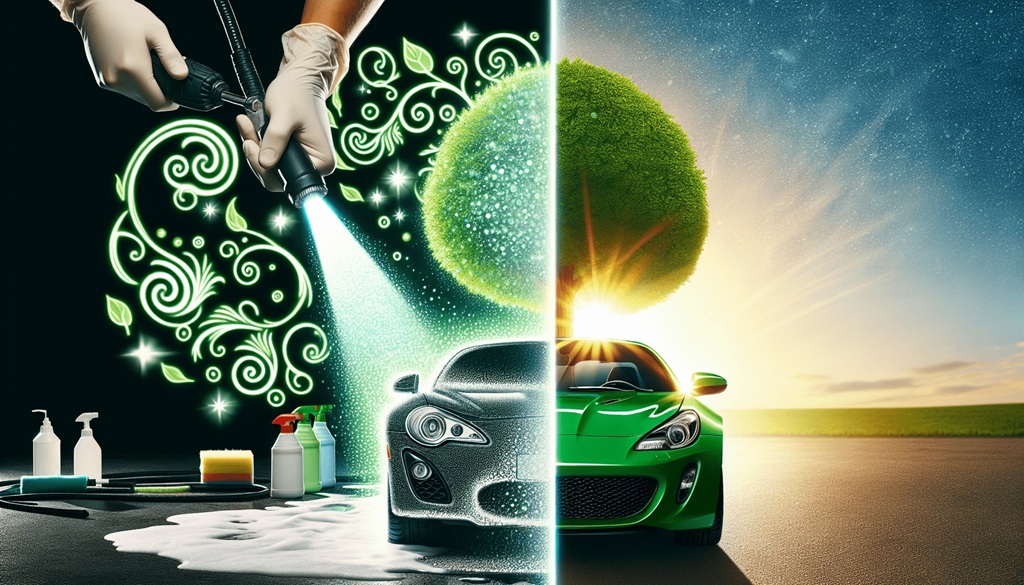In an era increasingly defined by environmental consciousness, even the simple act of washing your car has undergone a green revolution. The traditional image of sudsy runoff flowing into storm drains is rapidly being replaced by a vision of eco-friendly auto spas, where gleaming vehicles emerge alongside a lighter environmental footprint. This article delves into the burgeoning world of green car care, exploring the innovative technologies, sustainable practices, and compelling benefits that make eco-friendly auto spas a vital part of a cleaner future.
The Rising Tide of Environmental Awareness in Car Care

For decades, car washing was a largely unregulated process. Conventional car washes often relied on harsh chemicals that stripped away grime but also posed significant risks to local ecosystems. Phosphates, nitrates, and other pollutants found in traditional detergents can contaminate waterways, leading to algal blooms, oxygen depletion, and harm to aquatic life. Moreover, the sheer volume of water used in standard washes contributed to water scarcity, particularly in arid regions. As public awareness of these issues grew, consumers began demanding more sustainable alternatives.
This shift in consumer preference has spurred innovation within the auto care industry. Businesses are increasingly recognizing the value of adopting eco-friendly practices, not only to meet environmental regulations but also to attract environmentally conscious customers. The concept of an “eco-friendly auto spa” has emerged as a comprehensive approach to car care, encompassing everything from water conservation and biodegradable products to energy efficiency and waste reduction.
Key Pillars of an Eco-Friendly Auto Spa: Water Conservation and Management
Water is arguably the most precious resource in the car washing process. Traditional car washes can consume hundreds of gallons of water per vehicle, contributing to significant waste. Eco-friendly auto spas prioritize water conservation through a variety of strategies. One crucial technique is the implementation of closed-loop water recycling systems. These systems capture, filter, and reuse wash water, significantly reducing the amount of fresh water needed. Advanced filtration technologies, such as reverse osmosis and microfiltration, remove contaminants and purify the water, allowing it to be reused multiple times.
Furthermore, many eco-friendly spas are adopting waterless or low-water washing techniques. These methods utilize specialized cleaning solutions and microfiber cloths to effectively remove dirt and grime without the need for traditional rinsing. Waterless washing is particularly beneficial in areas facing water scarcity, as it can drastically reduce water consumption. Additionally, high-pressure, low-volume nozzles and efficient spray systems are used to minimize water usage while maximizing cleaning effectiveness.
Biodegradable and Non-Toxic Cleaning Products: A Gentle Touch for Your Car and the Planet
The chemicals used in car washing play a critical role in both cleaning efficacy and environmental impact. Conventional detergents often contain harsh chemicals that can damage vehicle finishes and harm the environment. Eco-friendly auto spas prioritize the use of biodegradable and non-toxic cleaning products. These products are formulated with plant-based ingredients and are free from harmful chemicals such as phosphates, sulfates, and volatile organic compounds (VOCs).
Biodegradable detergents break down naturally in the environment, minimizing their impact on waterways and soil. Non-toxic formulas are gentler on vehicle surfaces, preventing damage to paint, trim, and other components. Moreover, the use of eco-friendly products creates a safer working environment for auto spa employees and reduces the risk of exposure to harmful chemicals.
Beyond detergents, eco-friendly spas also utilize sustainable waxes, polishes, and sealants. These products are formulated with natural ingredients such as carnauba wax and plant oils, providing excellent protection and shine without the use of harsh chemicals. The selection of eco-friendly products extends to interior cleaning as well, with the use of natural upholstery cleaners, leather conditioners, and air fresheners.
Energy Efficiency and Sustainable Infrastructure: Powering a Greener Operation
Eco-friendly auto spas are not only focused on water and product sustainability but also on energy efficiency. Energy consumption is a significant factor in the environmental footprint of any business, and auto spas are no exception. To minimize energy use, many eco-friendly spas are investing in energy-efficient equipment and sustainable infrastructure.
LED lighting is a common feature in eco-friendly spas, replacing traditional incandescent and fluorescent bulbs. LED lights consume significantly less energy and have a longer lifespan, reducing both energy costs and waste. Solar panels are also being increasingly adopted to generate clean, renewable energy. These panels can power various aspects of the auto spa, from lighting and equipment to water heating and air conditioning.
Furthermore, eco-friendly spas are focusing on the overall design and construction of their facilities. Green building practices, such as the use of recycled materials, energy-efficient insulation, and natural ventilation, are being incorporated to minimize the environmental impact of the building itself. Efficient HVAC systems and water heaters are also crucial for reducing energy consumption.
Waste Reduction and Recycling: Closing the Loop on Sustainability
A comprehensive approach to sustainability involves minimizing waste and maximizing recycling. Eco-friendly auto spas are implementing various strategies to reduce their waste footprint. This includes the use of refillable containers for cleaning products, reducing the need for single-use plastic bottles. Recycling programs are also in place for materials such as cardboard, paper, and plastic.
Furthermore, many eco-friendly spas are composting organic waste, such as leaves and grass clippings collected during detailing services. Proper disposal of hazardous waste, such as used oil and filters, is also a priority. These materials are collected and disposed of according to environmental regulations, preventing contamination of soil and water.

The Benefits of Choosing an Eco-Friendly Auto Spa: A Win-Win for You and the Planet
Choosing an eco-friendly auto spa offers a multitude of benefits, both for consumers and the environment. For consumers, these spas provide a high-quality car wash experience with the added peace of mind that their vehicle is being cleaned in a sustainable manner. The use of gentle, non-toxic products ensures that vehicle finishes are protected and that the interior is free from harmful chemicals.
Environmentally, eco-friendly auto spas contribute to water conservation, reduce pollution, and minimize waste. By choosing these services, consumers are supporting businesses that prioritize sustainability and are actively working to protect the planet. Moreover, the use of eco-friendly products and practices can improve the overall health of local ecosystems and contribute to a cleaner, healthier environment.
The Future of Eco-Friendly Car Care: Innovations and Trends
The field of eco-friendly car care is constantly evolving, with new technologies and innovations emerging regularly. One promising trend is the development of advanced nanomaterials for car cleaning and protection. These materials can create hydrophobic surfaces that repel water and dirt, reducing the need for frequent washing.
Another area of innovation is the development of smart car wash systems that utilize sensors and data analytics to optimize water and energy usage. These systems can monitor water quality, adjust cleaning parameters, and track energy consumption, allowing for continuous improvement in sustainability.
Furthermore, the rise of electric vehicles (EVs) is driving the development of specialized car care services tailored to the unique needs of these vehicles. Eco-friendly auto spas are adapting their services to accommodate EVs, offering services such as battery cleaning and charging station maintenance.
Read More Also: Deep Dive into Plaine Products’ Unscented Natural Body Lotion
People Also Ask (FAQs)
Q: Are eco-friendly car washes more expensive?
A: While some eco-friendly car washes may have slightly higher prices due to the use of specialized products and equipment, the long-term benefits, such as reduced environmental impact and protection of your vehicle’s finish, often outweigh the cost.
Q: How can I tell if a car wash is truly eco-friendly?
A: Look for certifications from organizations such as the International Carwash Association or Green Seal. Inquire about the products and practices used, such as water recycling systems, biodegradable detergents, and energy-efficient equipment.
Q: Can I use eco-friendly car wash products at home?
A: Yes, many eco-friendly car wash products are available for home use. Look for products labeled as biodegradable and non-toxic.
Q: Do eco-friendly car washes clean as effectively as traditional washes?
A: Yes, eco-friendly car washes can be just as effective, if not more so, than traditional washes. The use of advanced cleaning solutions and techniques ensures a thorough clean without harming the environment.
Q: What are the benefits of using waterless car wash products?
A: Waterless car wash products conserve water, reduce runoff, and are convenient for use in areas with water restrictions. They can also be used for quick touch-ups between washes.
Discover More: Elate Cosmetics Bamboo Cheek and Contour Makeup Brush
Conclusion
The transition to eco-friendly auto spas is a testament to the growing awareness of environmental sustainability and the desire to minimize our impact on the planet. By embracing water conservation, biodegradable products, energy efficiency, and waste reduction, eco-friendly car washes are setting a new standard for responsible car care. Choosing these services not only ensures a spotless car but also contributes to a cleaner, healthier environment for future generations. As technology continues to advance and consumer demand for sustainable practices grows, the future of car care is undoubtedly green.




